President Donald Trump began his state visit to the United Kingdom on Monday with a day of ceremony, including a private lunch and a banquet dinner with Queen Elizabeth II at Buckingham Palace, tea with Prince Charles, and a visit to Westminster Abbey, the resting place of British war heroes and cultural greats.
But as my colleague Jim Carafano emphasizes, this trip won’t be all pomp and circumstance.
There are big issues at stake in this visit, as there always are in the Anglo-American relationship. And big issues are often controversial ones. From Britain’s relationship with Huawei to its support for the Iran nuclear deal, and most importantly of all, Brexit, the president has lots to discuss.
But curiously, one of the questions that is occupying the media is whether the president will meet with Boris Johnson, the former mayor of London, best-selling author, member of Parliament, and the leading contender to take over the Conservative Party and become prime minister after Theresa May stands down as party leader June 7.
When you put it that way, it seems ridiculous that this is even a question.
Johnson is a major political figure in Britain, and indeed the world. Yes, Johnson—who resigned from May’s government over her handling of Brexit, Britain’s exit from the European Union—is also a political rival of May’s. But she herself has announced that she is stepping down.
If the president meets with Johnson, that would not undermine May. She did that all by herself.
It is not as though British or American political leaders have always met only with their counterparts. Back in July 2012, for example, British Prime Minister David Cameron met with Republican presidential challenger Mitt Romney a mere four months before the U.S. election.
Any controversy around this issue is fake.
The president of the United States can meet whoever he wants to meet. He needs no one’s permission. The controversy stems, rather, from people who don’t like Trump or Johnson, and there are quite a few of those in Britain, and in the media. They will get their chance come polling day. Right now, the U.S. and Britain have serious, and sometimes controversial issues to discuss.
The real news is that the president has emphasized, yet again, his support for a strong Anglo-American relationship and reiterated that, in his words, “a big trade deal is possible once [the] U.K. gets rid of the shackles” of the EU.
That is precisely the right point for the president to make, and it’s one he needs to keep on making as often as possible.
The United Kingdom and the United States have the opportunity to negotiate a free trade area. But this can only happen if the U.K. leaves the EU, as British voters demanded back in June 2016.
It’s high time the British political establishment stops subverting the outcome of that vote, and gets down to the important business of pulling off those shackles and starting to negotiate with the United States, and with Britain’s other friends and allies around the world.
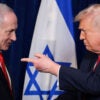

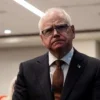









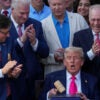
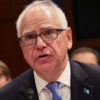














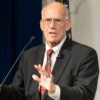

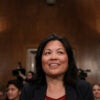
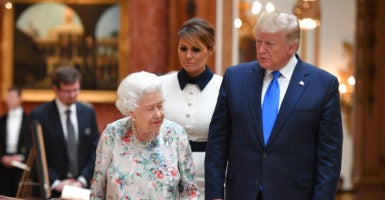
One Reply to “Theresa May Will Be Gone in Days. Why Not Meet With Boris Johnson?”